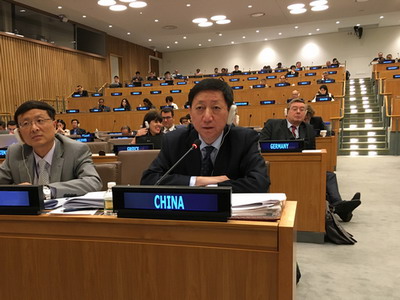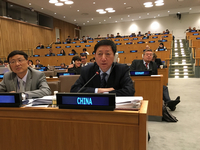
Madam President,
The Chinese delegation would like to thank the Secretary General for his report presented under Article 319 of the United Nations Convention on the Law of the Sea (UNCLOS or the Convention) and thank the Secretariat for its work. China has the following comments to make:
One, we should foster a sense of community of shared destiny in the oceans and seas and promote sustainable marine development. The oceans and seas are the shared home for humanity and a cherishable realm to achieve sustainable development. We should foster a sense of community of shared destiny in the oceans and seas and stand together to address challenges and strive for common development through practical cooperation. China is committed to sustainable marine development and has been promoting international cooperation in this area through such initiatives as "Blue Economy" and the "21st Century Maritime Silk Road". China stands ready to work with all parties towards the goal of conserving and sustainably using the oceans, seas and marine resources as articulated in the 2030 Agenda for Sustainable Development.
Two, we should maintain the authority and integrity of the UNCLOS in good faith and promote a fair and equitable order for the oceans and seas. The UNCLOS provides a comprehensive legal framework and essential basis for the ocean and sea related activities of all States. It contains balanced provisions on, inter alia, the rights of coastal States, the right of other States to peaceful use of the seas, and the rational use and scientific conservation of the seas. The dispute settlement mechanism therein is an indivisible package, which unequivocally provides that the means chosen by States of their own accord to settle disputes between them takes precedence and that compulsory procedures are merely supplementary in nature and subject to strict conditions and restrictions. The optional exclusionary declarations made by States pursuant to Article 298 of the Convention are part and parcel of the dispute settlement mechanism under the Convention and have legal force. It is incumbent upon all parties to uphold the purposes of the Convention and to interpret and apply the Convention and the dispute settlement mechanism therein accurately, in its entirety and in good faith, avoiding abuse thereof or unjustified expansion of jurisdiction. Matters not regulated by this Convention shall continue to be governed by the rules and principles of general international law.
Madam President,
The Meeting of States Parties ought to discuss matters of a general nature pertaining to the Convention, not bilateral disputes. It is much less a suitable forum for a discussion on the South China Sea issue, not to mention this agenda item has nothing to do with the South China Sea issue. However, some delegations, in their interventions, still made references to the South China Sea issue, including the South China Sea arbitration, which interfered with the Meeting's agenda. What they cited in their interventions is inconsistent with facts. China wishes to bring to light the truth of the matter on the basis of facts and international law.
Some States expressed concern over the situation in the South China Sea, referring to the so-called "large-scale land reclamations" and "militarization". What we need to establish with clarity before anything else is the nature of the relevant activities. In fact, related countries illegally seized some of China's islands and reefs in Nansha Islands, conducted large-scale construction and deployed military forces and offensive weapons there. This constitutes an illegal act in contravention of international law. This is a real case of driving the militarization of the South China Sea. China's construction on its own islands and reefs is only reasonable and legitimate. The relevant construction works serve civil purposes and international public interests, in fulfillment of the international duties and obligations undertaken by China. In such construction activities, China is guided by the philosophy of ecological protection and uses state-of-the-art environmental protection technologies to avoid any adverse impact on the ecosystem. China's deployment of necessary defense installations on its own islands and reefs is in exercise of its legitimate rights under international law. It is purely for purposes of defense and has nothing whatsoever to do with "militarization". Nor does it in any way compromise the freedom of navigation and overflight in the South China Sea.
The essence of the South China Sea arbitration is territorial sovereignty and maritime delimitation. Its real intention is to deny China's territorial sovereignty and maritime rights in the South China Sea. It is a matter to which the arbitration procedures under the Convention manifestly should not apply. Firstly, the issue of territorial sovereignty is beyond the scope of the UNCLOS. Secondly, as regards maritime delimitation, China made a declaration under Article 298 of the Convention, excluding in explicit terms issues concerning, among others, maritime delimitation from compulsory arbitration. Furthermore, China and the State in question made a clear commitment in a series of bilateral and multilateral documents to settle relevant disputes through direct negotiation.
Therefore, this arbitration was wrongly initiated, is placed under wrong jurisdiction and will result in a wrong award. The Arbitral Tribunal manifestly has no jurisdiction and going ahead with it was an improper ultra vires act, to the detriment of China's legitimate rights and interests and in a departure from the overarching aim of peaceful dispute settlement. Any decision to be made by a body that has no jurisdiction to start with would have no legal force, so there is no "abiding by it and implementing it" to speak of; nor can it presume to embody the principle of rule of law. The position of non-participation, non-acceptance and non-recognition maintained by China is for the very purposes of defending China's own legitimate rights and interests pursuant to international law, maintaining the integrity and authority of the Convention, and upholding international rule of law.
Madam President,
China attaches great importance to peace and stability in the South China Sea, and has consistently handled the South China Sea issue in a responsible manner and a constructive spirit. China has put in tremendous efforts to maintain overall stability and freedom of navigation in the South China Sea and made huge contributions to this end. China will continue to work with ASEAN countries to fully and effectively implement the Declaration on the Conduct of Parties in the South China Sea (DOC) and, within the DOC framework, push for continuous headway in the consultations on a "Code of Conduct in the South China Sea". China is committed to peaceful settlement of disputes through negotiation and consultation, to proper management of disputes by establishing rules and mechanisms, to a win-win outcome through development and cooperation, and to upholding freedom of navigation and over flight in the South China Sea and its peace and stability, so as to make the South China Sea a sea of peace, friendship and cooperation. We hope relevant countries will work together with China to jointly uphold peace, stability and prosperity in the South China Sea.
I thank you, Madam President.

